What Makes Georgia a Top Logistics Infrastructure Hub
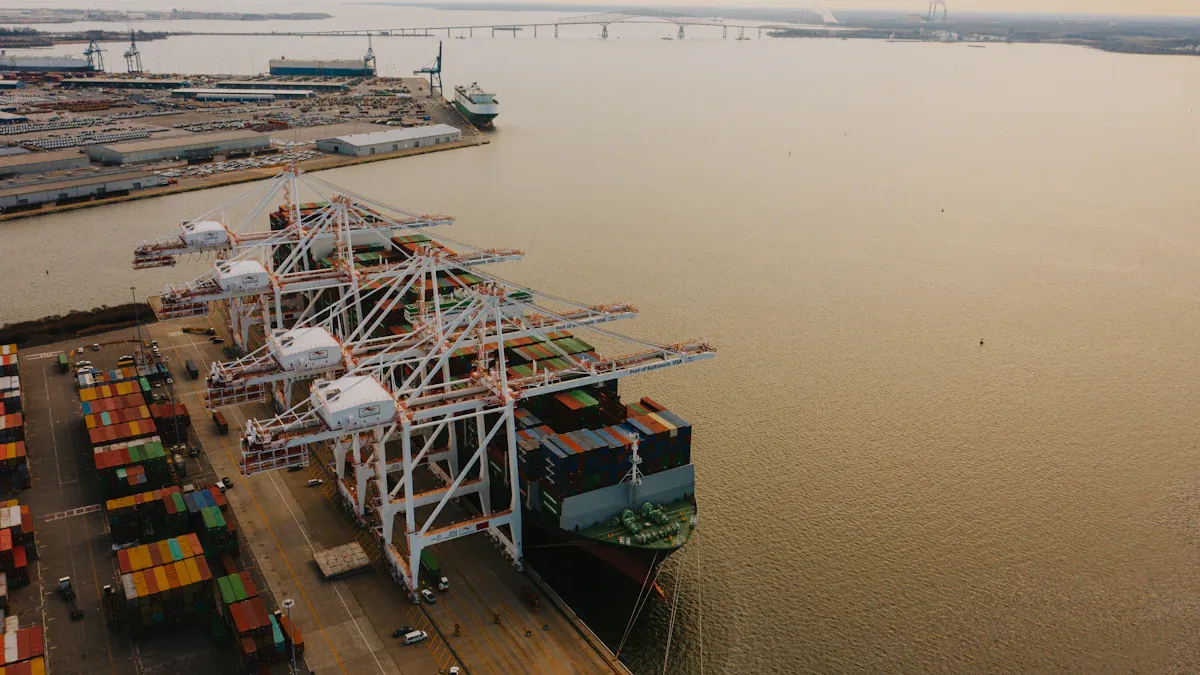
Georgia stands as the #1 logistics infrastructure hub in the United States. You benefit from its strategic location, which connects you to major markets and reduces shipping costs. The robust transportation network—featuring highways, railroads, and the world’s busiest airport—supports fast, reliable deliveries. The Port of Savannah gives you direct access to global trade. A business-friendly environment and skilled workforce drive innovation, making the georgia logistics infrastructure hub the top choice for your logistics needs.
Central location for reaching key U.S. cities
Extensive highway, rail, and air cargo options
Supportive policies and incentives for logistics companies
Key Takeaways
Georgia's central location allows you to reach 80% of the U.S. population within two days by truck, saving time and reducing shipping costs.
The state boasts a robust transportation network, including highways, railroads, and the Port of Savannah, which connects you to global markets efficiently.
Georgia offers a skilled workforce and strong educational programs, ensuring you have access to trained professionals ready to meet your logistics needs.
Business-friendly policies, including tax incentives and training support, help lower costs and promote growth for logistics companies in Georgia.
Ongoing investments in infrastructure and innovation keep Georgia at the forefront of logistics, enhancing delivery speed and reliability for your business.
Georgia Logistics Infrastructure Hub
Strategic Location
You find Georgia at the heart of the Southeast, making it the perfect place for moving goods quickly. The georgia logistics infrastructure hub stands out because you can reach 80% of the U.S. population within a two-day truck drive. Atlanta sits in a central spot, so your shipments travel shorter distances and arrive faster.
Atlanta’s central positioning in the Southeastern United States allows companies to access 80% of the U.S. population within a two-day trucking distance, significantly reducing transit times and costs for logistics operations.
The Port of Savannah gives you a direct link to global trade. It is the fastest-growing port in the country and sits close to major highways and Atlanta. This location helps you export American-made products with ease. Georgia’s interstates and railroads connect you to important cities and markets.
Here is a chart showing how Georgia ranks compared to other states as a logistics hub:
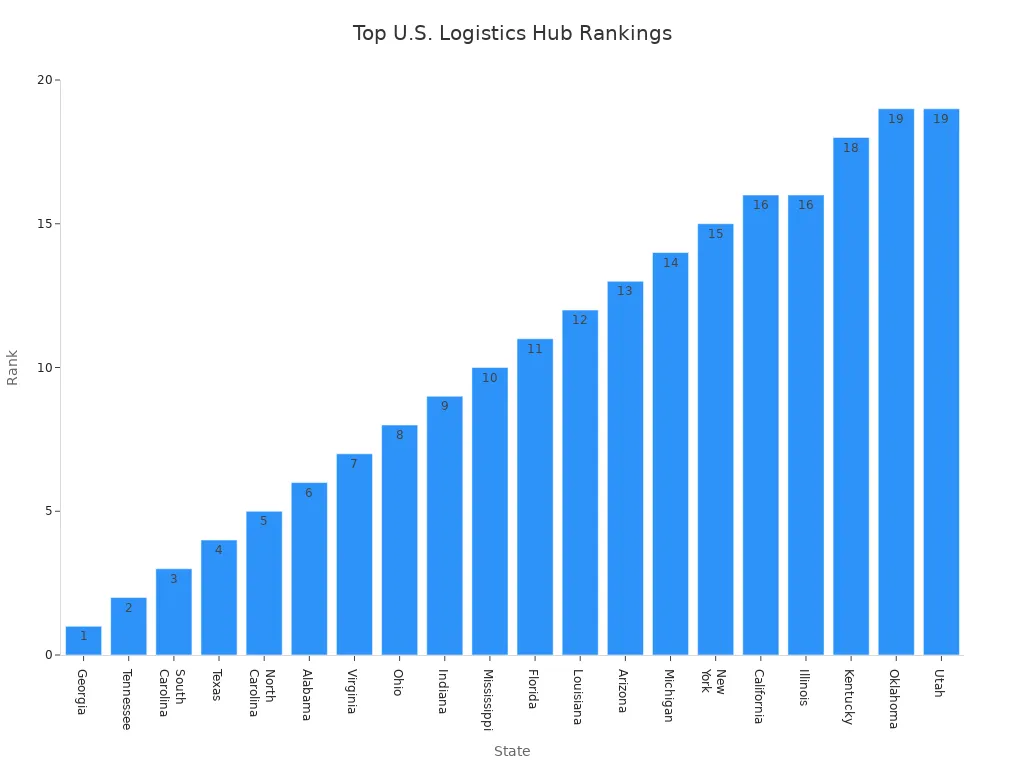
You see Georgia ranked #1 for supply chain and logistics hubs by Area Development Magazine. The state’s geography gives you a big advantage over other places.
Quick Facts:
Georgia’s rail system covers 5,000 miles and moves 200 million tons of freight every year.
The Port of Savannah is the westernmost container port on the East Coast, helping you reach inland markets faster.
Hartsfield-Jackson Atlanta International Airport boosts your air cargo options.
Market Access
You benefit from Georgia’s easy access to major consumer and industrial markets. The georgia logistics infrastructure hub lets you reach big cities and important customers without long delays. Companies in Georgia can access 80% of the U.S. market within a two-day drive. This means you save time and money on shipping.
Rank | State |
|---|---|
1 | Georgia |
2 | Tennessee |
3 | South Carolina |
4 | Texas |
5 | North Carolina |
Georgia’s geography connects you to key population centers in the Southeast. You use highways, railroads, and ports to move products quickly. The state invests in new infrastructure, like the $1.5 billion roadwork initiative, to make freight transport even better. The Georgia Ports Authority expanded the Mason Mega Rail Terminal and increased container slots, so you get more capacity and faster service.
Georgia’s transportation network includes major interstates and a vast rail system.
The Port of Savannah and the Appalachian Regional Port open new markets for your business.
Georgia ranks first for workforce development programs, cost of doing business, and responsive state government.
The georgia logistics infrastructure hub gives you the tools to grow your business and reach new customers. You see Georgia recognized as the top state for business, infrastructure, and logistics year after year.
Award/Recognition | Description |
|---|---|
2023 Top Supply Chain Projects Award | Awarded to Georgia Ports Authority and Kaleris for their contributions to logistics infrastructure. |
CNBC #1 for Infrastructure | Georgia ranked #1 in the U.S. for infrastructure in America’s Top States for Business in 2024. |
Area Development Top State to Do Business | Georgia recognized as the Top State to Do Business for 11 consecutive years. |
The georgia logistics infrastructure hub helps you compete in today’s fast-moving market. You get faster delivery, lower costs, and better access to customers.
Transportation Network
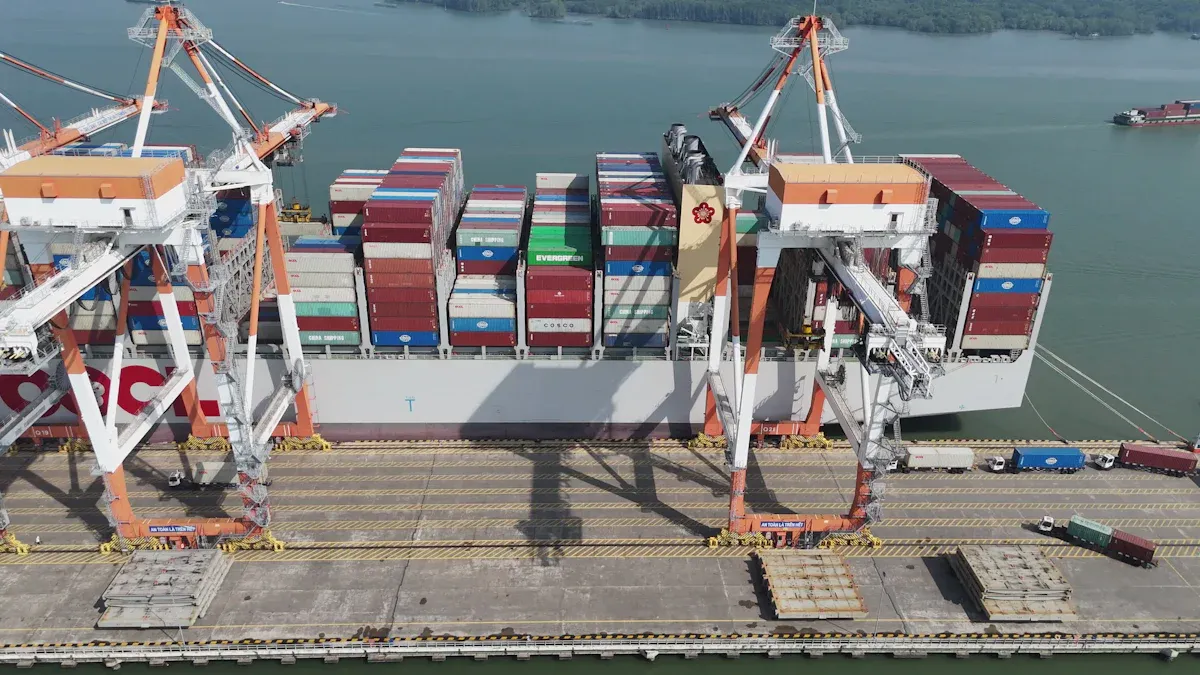
Georgia gives you one of the most advanced transportation networks in the country. You can move products quickly and reliably using air, sea, rail, and road options. The georgia logistics infrastructure hub connects you to major markets and supports your business growth.
Air Connectivity
You rely on Hartsfield-Jackson Atlanta International Airport for fast air cargo shipments. This airport ranks as the 12th largest air cargo hub in North America. It handles over 2 million square feet of cargo warehousing space. You get access to more than 160 nonstop U.S. destinations and nearly 70 international cities in over 45 countries. The airport supports about 2,600 daily takeoffs and landings. Last year, cargo operations grew by 6%.
Hartsfield-Jackson serves as the largest inland port in the world, making it a global gateway for the southeastern United States. You can reach over 80% of the U.S. population within two delivery days.
Ports
You benefit from Georgia’s powerful seaports. The Port of Savannah is the second busiest container port in the nation, handling 5.7 million TEUs in FY2025. The Port of Brunswick leads the country in roll-on/roll-off cargo, moving 870,775 units. These ports connect you to global trade routes and help you ship products efficiently.
Port | Cargo Handled (FY2025) | National Ranking |
|---|---|---|
Port of Savannah | 5.7 million TEUs | Second busiest port nationally |
Port of Brunswick | 870,775 units | Busiest for Roll-on/Roll-off |
Rail System
You use Georgia’s rail system to move freight across the state and beyond. The network covers 5,000 miles and supports economic growth. Rail offers reliability, cost-effectiveness, and environmental benefits. You can ship different types of cargo using specialized rail cars. The State Rail Plan helps connect industries and ports, making the georgia logistics infrastructure hub even stronger.
Georgia’s rail system supports seamless intermodal connections.
Norfolk Southern Railroad links you to interior cities in the Southeast and Midatlantic regions.
Rail helps you move goods quickly and sustainably.
Highways
You take advantage of Georgia’s 20,000 miles of state and federal highways. This network lets trucks connect to major markets and supports 14,000 daily truck transactions. You can reach 80% of the U.S. market within two days by truck. The expanding highway system helps you adapt to changing business needs and keeps your logistics operations efficient.
Component | Description |
|---|---|
Central to trade growth, providing direct routes to key cities for truck fleets. | |
Intermodal Transportation | Enables seamless transition between different transportation modes, enhancing cost-effectiveness. |
Expanding Highway Network | Supports efficient domestic shipments, allowing quick adaptation to changing plans. |
You see how the georgia logistics infrastructure hub uses advanced logistics operations and seamless intermodal connections to keep your supply chain moving.
Infrastructure Investment
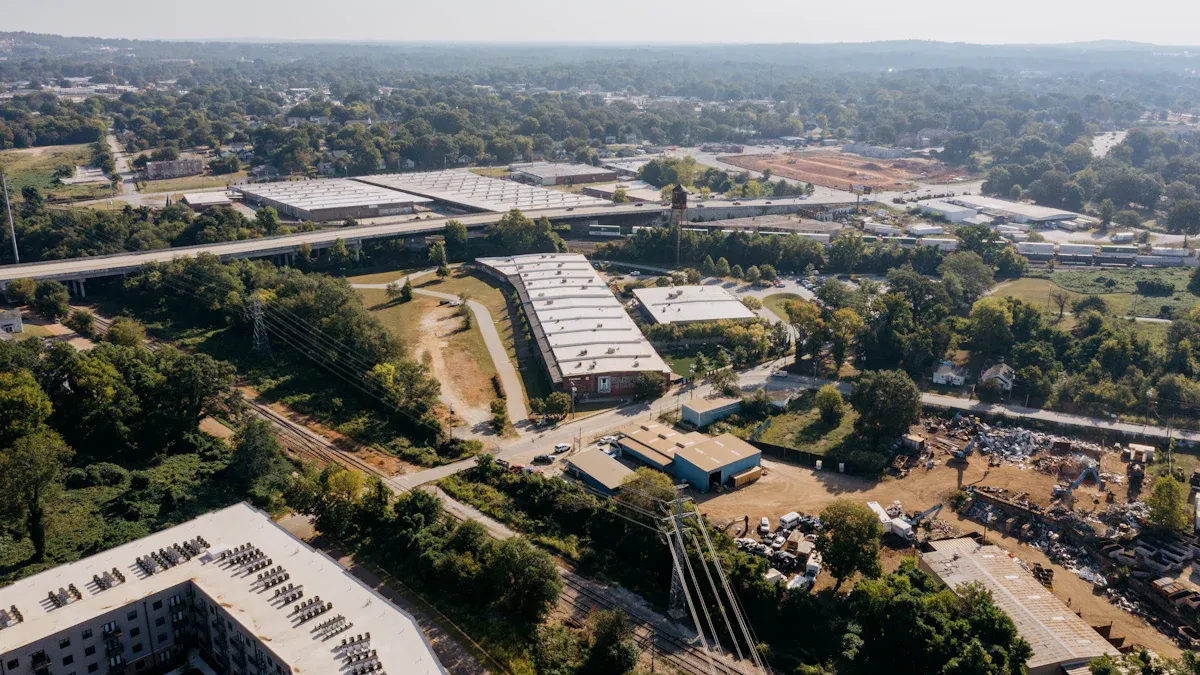
Expansion Projects
You see Georgia investing billions to expand its logistics infrastructure. The state upgrades ports, airports, and rail systems to boost capacity and speed. At the Port of Savannah, new ship-to-shore cranes and berth realignment help move more containers each year. The Ocean Terminal transforms into a container-only facility, which increases efficiency. Mason Mega Rail Terminal now doubles rail capacity, making freight movement faster.
Project Description | Capacity Increase | Completion Date |
|---|---|---|
Expansion of container-handling capabilities at GPA | Over the next 12 years | |
Berth realignment at Garden City Terminal | 1.5 million TEUs/year | Completed |
New ship-to-shore cranes at Garden City Terminal | 8 cranes | 2023 |
Ocean Terminal transformation | 2.0 million TEUs/year | 2026 |
Container yard with electric gantry cranes | 1 million TEUs/year | 2023-2024 |
Cross-docking warehouse construction | 400,000 TEUs/year | September 2023 |
Mason Mega Rail Terminal expansion | Doubles rail capacity to 2 million | November 2021 |
Near-dock warehousing at Colonels Island Terminal | Up to 1,410,000 vehicles/year | 2023 |
Addition of a fourth berth at Colonel’s Island | Accommodates larger vessels | Ongoing |
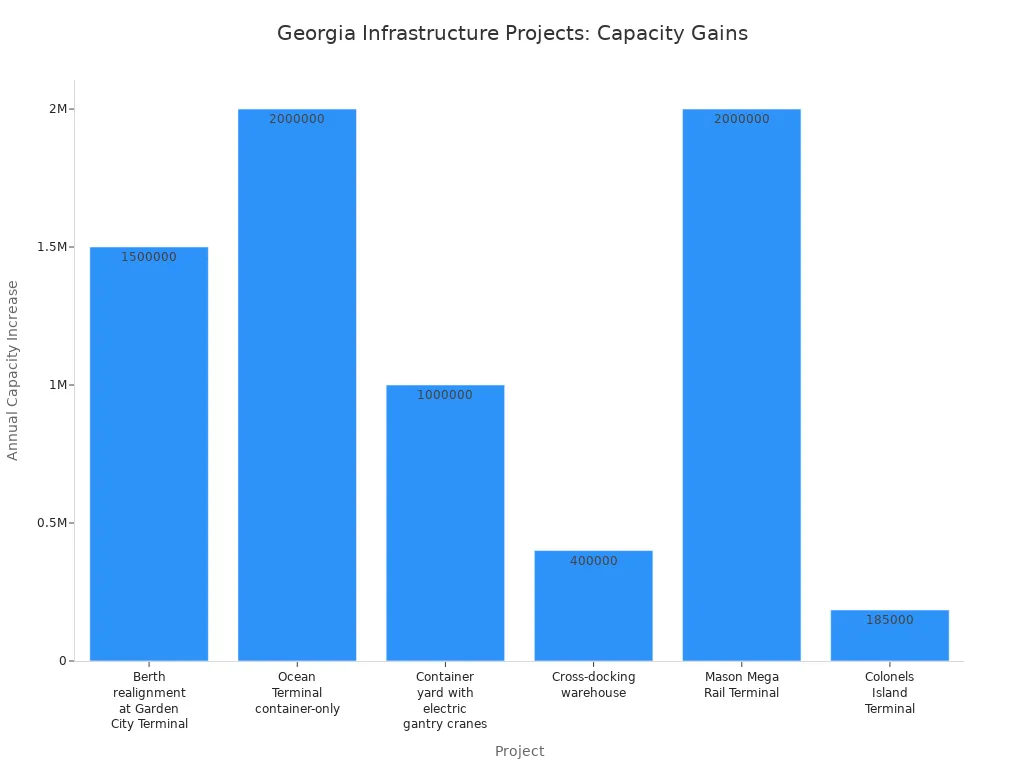
You benefit from upgrades at Georgia’s 103 public-use airports. Hartsfield-Jackson Atlanta International Airport generates $73.7 billion in annual economic impact. State funding for aviation jumped from $13 million in 2017 to $44 million in 2023. Georgia approved $1.5 billion in 2024 for transportation projects, including a freight program to improve efficiency and safety.
Innovation
You experience innovation in Georgia’s logistics every day. The partnership between Pipedream and Curiosity Lab created the world’s first underground logistics network in Peachtree Corners. This system uses autonomous robots to deliver goods on demand, reducing traffic and carbon emissions. You see how technology transforms delivery speed and sustainability.
Georgia tracks intermodal containers, so you always know where your cargo is. The Port of Savannah completes 500,000 rail moves each year, often in less than 24 hours. You get flexible scheduling with 38 weekly containership services. The state plans to invest $3.6 billion over the next decade to expand container capacity and improve infrastructure.
Public-private partnerships help Georgia stay ahead. The Asian Development Bank works with local agencies to train officials and develop new projects. You benefit from these efforts, which make logistics more reliable and efficient.
Georgia’s commitment to innovation and investment keeps you connected to global markets and ensures your supply chain runs smoothly.
Workforce And Business Climate
Skilled Talent
You gain access to one of the most skilled logistics workforces in the country. Georgia’s talent pool stands out for its size and expertise. Many logistics professionals choose Georgia for its competitive wages and career opportunities. Here is how Atlanta compares to other major logistics hubs:
Position Type | Atlanta | Dallas-Fort Worth | Houston | Chicago |
|---|---|---|---|---|
Warehouse Associate | $15.75 - $18.25/hr | $16.50 - $19.00/hr | $16.25 - $18.50/hr | $17.50 - $20.50/hr |
Forklift Operator | $17.50 - $20.75/hr | $18.50 - $22.00/hr | $18.25 - $21.50/hr | $19.75 - $23.25/hr |
Warehouse Supervisor | $51,000 - $64,000/yr | $55,000 - $68,000/yr | $53,000 - $66,000/yr | $58,000 - $72,000/yr |
Logistics Manager | $70,000 - $88,000/yr | $75,000 - $95,000/yr | $73,000 - $92,000/yr | $78,000 - $98,000/yr |
You find a workforce ready to meet your needs, from warehouse associates to logistics managers.
Education Initiatives
You benefit from Georgia’s strong focus on logistics education. Colleges and universities partner with industry leaders to create programs that match real-world needs.
Institution | Program Description |
|---|---|
Ogeechee Technical College | Offers advanced training in mechatronics and robotics, including exclusive FANUC robotics training. |
Provides degrees in manufacturing engineering and supply chain management with a logistics focus. | |
Georgia Quick Start | Delivers top-ranked, custom workforce training at no cost for qualified projects. |
Over fifty College and Career Academies in Georgia train students in logistics and supply chain skills.
The Southern Center for Logistics and Intermodal Transportation connects you with research, training, and industry expertise.
Georgia’s education system works with business leaders to develop talent pipelines.
Programs like the HOPE Scholarship and Georgia Match Program make higher education more accessible for logistics careers.
You see education pathways aligned with high-demand logistics jobs, ensuring a steady flow of skilled workers.
Economic Incentives
You enjoy a business climate designed to help logistics companies grow. Georgia offers tax credits, exemptions, and training support to lower your costs and boost your success.
Incentive Type | Description |
|---|---|
Job Tax Credits | Earn $1,250–$4,000 per job, per year, for five years when you create new jobs. |
Sales and Use Tax Exemptions | Save on equipment, raw materials, and energy used in manufacturing and warehousing. |
Quick Start Employee Training | Receive free, customized workforce training for new or expanding operations. |
Mega Project Tax Credit | Get $5,250 per job for large projects that create at least 1,800 jobs and invest $450 million or more. |
Quality Jobs Tax Credit | Gain $2,500–$5,000 per job, per year, for five years for high-paying positions. |
You also benefit from lower warehouse and distribution center costs compared to other major hubs. Georgia’s business-friendly policies and strong support for logistics companies make it a top choice for your supply chain operations.
Supply Chain Impact
Efficiency
You experience faster and more reliable supply chains in Georgia. The state invests $1.5 billion in roadwork and freight programs to reduce congestion and improve delivery times. Hartsfield-Jackson Atlanta International Airport adds new gates and a sixth runway, giving you more options for air cargo. The Port of Savannah increases container capacity by 20% with new slots and berth renovations. You see how the Mason Mega Rail Terminal connects trucks, trains, and ships for smooth transfers.
Efficiency Factor | Benefit to You |
|---|---|
Roadwork Improvements | Less congestion, quicker deliveries |
Air Cargo Advancements | More flights, faster shipping |
Port Development | Increased container capacity, reduced wait times |
Modal Agility | Easy switching between road, rail, air, and ocean transport |
Workforce Development | Skilled workers ready to solve supply chain challenges |
You notice real results from these improvements:
GreenLeaf Essentials cuts order fulfillment times by 40% and boosts inventory accuracy to 99.2%. The company grows 200% each year without higher logistics costs.
Meridian raises inventory accuracy to 99.7%, lowers transportation costs by 23%, and shortens order cycle time from 5.2 days to 2.1 days.
Companies using innovative third-party logistics providers save 15–25% on costs and deliver products faster.
A supply-chain review at General Mills finds $3 million in savings and removes 130,000 under-used transportation miles each year.
Georgia’s logistics network helps you deliver products quickly, save money, and keep customers happy.
Economic Growth
You help drive Georgia’s economy when you use its logistics infrastructure. The sector employs over 250,000 people and supports more than 32,000 logistics businesses. Georgia’s ports support 609,197 jobs, which means nearly one in eight jobs in the state connects to port activity.
Economic Metric | Value in Georgia |
|---|---|
Logistics Employment | 250,000+ jobs |
Port-Supported Jobs | 609,197 jobs |
Logistics Establishments | 32,000+ businesses |
Economic Impact | $83.4 billion annually |
Sales from Logistics Sector | $171 billion (12% of state sales) |
Port-Related GDP Contribution | $72 billion (9% of state GDP) |
Personal Income from Ports | $40 billion (6% of state income) |
Businesses invest over $21 billion in Georgia, with 84% tied to logistics.
The state sees a 22% rise in sales and GDP from port trade since 2021.
Income from port-supported businesses grows by 21% in the same period.
You benefit from Georgia’s strong logistics sector, which creates jobs, attracts investment, and powers economic growth across the state.
You see Georgia lead the nation in logistics with its central location, strong infrastructure, and skilled workforce. The state invests in innovation and technology, making supply chains faster and smarter. Over 15,000 logistics businesses call Georgia home. You benefit from new opportunities as the Georgia Ports Authority plans $4.5 billion in upgrades. The logistics sector adds $107 billion to the economy and keeps growing.
Experts predict more growth through synchro-modality and tech-enabled supply chains.
Georgia’s education programs prepare you for future logistics careers.
Georgia gives you the tools to succeed in logistics now and in the future.
FAQ
What makes Georgia’s location ideal for logistics?
You find Georgia in the Southeast, close to major highways, ports, and rail lines. You can reach 80% of the U.S. population within two days by truck. This location helps you move goods quickly and save money.
How do Georgia’s ports support global trade?
You use the Port of Savannah and the Port of Brunswick to ship products worldwide. These ports handle millions of containers each year. You get fast access to international markets and reliable shipping schedules.
What incentives does Georgia offer logistics companies?
You receive tax credits, sales tax exemptions, and free workforce training. These incentives lower your costs and help your business grow.
Tip: Check with the Georgia Department of Economic Development for the latest programs.
How does Georgia invest in logistics innovation?
You benefit from new technology, such as automated warehouses and smart tracking systems. Georgia supports public-private partnerships and funds research to keep logistics efficient and modern.
See Also
Effective Strategies by PGL for Efficient U.S. Warehousing
Streamlined Freight Services Throughout the Southeast by PGL
PGL's Miami Warehouse Solutions for Quick East Coast Shipping
Dependable East Coast Warehousing and Distribution Services Offered
PGL's Strategic Warehousing in Miami and LA for Supply Chain Efficiency
